Search
Showing 10 of 1867 results for how to register international groups
-
Intelligence
On this page are links to a number of websites that host
IntelliLab
This is ENZ's intelligence hub for international education providers and hosts the latest information on student numbers and trends, market information, industry valuations, research, and insights on recent developments, to help industry make informed decisions. Home | ENZ IntelliLab
Ministry of Foreign Affairs and Trade Market reports
In these market reports you will find the latest market intelligence from New Zealand's Ministry of Foreign Affairs and Trade. MFAT Market Intelligence Reports | New Zealand Ministry of Foreign Affairs and Trade
New Zealand Trade and Enterprise
On this website, are market guides and events to support businesses with their export journey. NZTE helps New Zealand businesses grow in international markets
-
Replacement for China’s discontinued JSJ List announced
JSJ is the abbreviation in Chinese for ‘Website of Information on International Education Affairs Supervision and Management’ (Chinese Pinyin: Jiaoyu Shewai Jianguan Xinxiwang; Chinese Characters: 教育涉外监管信息网). Since 2003, this had been a key portal used by Chinese students and families to find information on overseas institutions. To be added to the JSJ list, providers had to apply to China’s MoE for approval but in late 2022, the JSJ List for all countries was removed from the JSJ Website. Education New Zealand Manapou ki te Ao (ENZ) has been informed that this list will not be returning.
A new list of international institutions was released in late 2023 on the Smart Education of China website (Chinese Pinyin: Guojia Zhihui Jiaoyu Gonggong Fuwu Pingtai; Chinese characters: 国家智慧教育公共服务平台). This is an official government website supplying standardised information and services on education to the public.
New Zealand institutions will appear on the new list if a student had a qualification from that institution successfully verified by the Chinese Service Centre for Scholarly Exchange (CSCSE), within the past five years. The CSCSE is the agency under China MoE mandated to provide verification of foreign qualifications. It should be noted that the CSCSE’s scope of services extends only to qualifications at the equivalent of Level 5 and above on the New Zealand Qualifications and Credentials Framework. This process is automatic, and institutions cannot apply to China MoE or CSCSE to be listed. A summary of the New Zealand Higher Education Institutions included on this CSCSE list (as of January 2024) can be found here.
Notably CSCSE has an existing list of overseas institutions which have issued qualifications that students have successfully verified through the agency. The information on the Smart Education of China website replicates this list. Any updates to the listed institutions will be made to both lists simultaneously. The CSCSE List is available (in Chinese) here - https://yxcx.cscse.edu.cn/rzyxmd?aisiteOutPageId=515a44d6f5774554a701ff1b20802c0b
If you have any questions in relation to the above that relate to qualification recognition, please contact the NZQA team at: internationalunit@nzqa.govt.nz
If you have any questions in relation to the above that relate to the China market, please contact ENZ’s China team – China@enz.govt.nz
-
NZIEC KI TUA theme and early bird registration prices announced
The 31st New Zealand International Education Conference KI TUA 2024 (NZIEC KI TUA) will be held in Te Whanganui-a-Tara Wellington from 6 - 8 August at Tākina Convention Centre.
The theme for this year’s conference is Te Ara ki te Ao.
Step into a world of boundless possibilities at NZIEC KI TUA 2024 where we will delve into the heart of ‘Global Growth Unleashed' and the transformative power international education can bring in today’s world of unprecedented connectivity.
Early bird registrations for NZIEC KI TUA 2024, will be available very soon so keep an eye out for future communications or visit NZIEC 2024 from early March.
Registration Costs for NZIEC KI TUA 2024
2024 Early bird registration
$725 incl GST
Two-day conference, Welcome Function and Farewell Hour
2024 Standard registration
$800 incl GST
Two-day conference, Welcome Function and Farewell Hour
2024 Gala Dinner
$150 incl GST
Inc drinks, nibbles and 3 course dinner
1 day rate early bird
$375 incl GST
One-day conference, Welcome Function or Farewell Hour
1 day rate standard
$400 incl GST
One-day conference, Welcome Function or Farewell Hour
-
New Zealand Schools Scholarships 2024 launches in Viet Nam
This scholarship, launched by Education New Zealand Manapou ki te Ao (ENZ) and New Zealand schools, provides a 50% subsidy towards selected Vietnamese middle and high school students currently in grades 8 – 10 in Viet Nam. Applications opened on 22nd January 2024 and close at 11:59pm Indochina Time on 17th March 2024.
Interest in studying with New Zealand remains high amongst students and parents in Viet Nam, with recent fairs held in both Ho Chi Minh City and Hanoi receiving between 400-500 attendees respectively.
Viet Nam continues to be a priority market for New Zealand schools. Pre-COVID, the sector saw 80 percent growth in students from Viet Nam between 2017 and 2019. Currently, Vietnamese high school students account for 15% of the entire Vietnamese student base here in New Zealand.

This initiative aims to simultaneously increase interest and enrolments from high quality Vietnamese students into New Zealand schools, whilst also providing support to the students and families themselves by reducing the financial barrier to study overseas.
ENZ’s Business Development Manager Mary Camp said the New Zealand School Scholarships initiative has attracted quality students with high grade point average and good English language ability to study in New Zealand.
“We are impressed with the calibre of students we have welcomed through this programme. Many of them have had academic success and gone on to study at high-quality universities in NZ.”
“Schools are excited to welcome students from Viet Nam and eager for them to experience our quality education in a safe and nurturing environment.
Mary added that the support of the Schools in International Education Business Association (SIEBA) has been valuable.
“SIEBA supports this programme by undertaking reference checks of interested education agents, thus reducing the burden on schools and helping them connect with new agents. Activating new agents in Viet Nam helps the entire sector”.
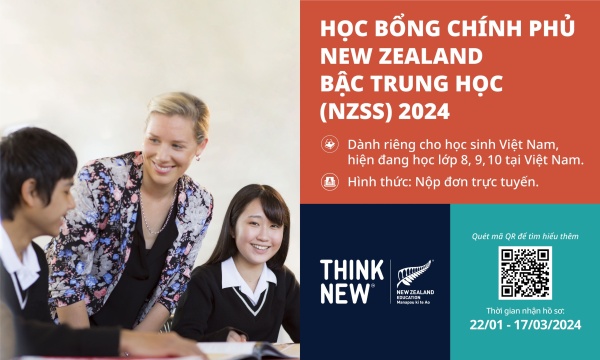
ENZ’s Regional Director – Asia, Ben Burrowes said he was pleased to see the New Zealand Schools Scholarships initiative continue in 2024.
“ENZ is absolutely committed to its education relationship with Viet Nam and we’re excited to welcome more scholarship winners this year, enriching our schools, classrooms and communities here in New Zealand.
"As the scholarship continues to run each year, it allows new scholarship winners to meet previous scholarship winners and form a community of their own,” said Ben.
"Since its initial launch in 2018, the New Zealand School Scholarships initiative in Viet Nam has grown to become a prestigious, top of mind scholarship for local students," he added.
The New Zealand School Scholarship initiative is just one of the initiatives that Education New Zealand Manapou ki te Ao delivers as part of its investments into the Vietnamese – New Zealand relationship. Other initiatives include student fairs, co-funding agent events and engagements, media and PR initiatives as well as supporting institutional partnerships.
Celebrating past recipients of the New Zealand School Scholarship
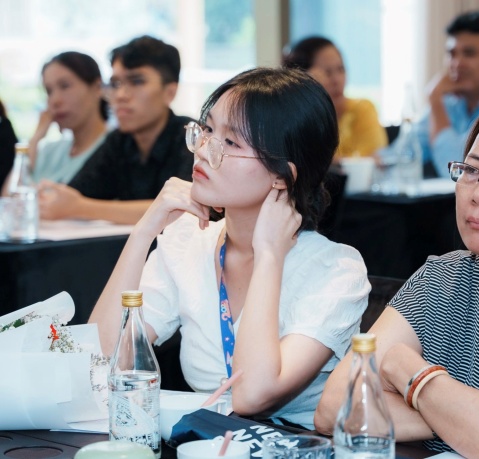
Dinh Minh Thao
2023 New Zealand School Scholarship recipientWith a strong desire to venture beyond her comfort zone, Dinh Minh Thao courageously applied for and successfully attained the NZSS 2023, starting her educational journey at Newlands College (Wellington, New Zealand) in July 2023.
In just six months, she immersed herself in studies, actively participated in various extracurricular activities, and experienced numerous "first in life" experiences including contributing to cultural events and participating in the festival of the Indian community. Notably, she challenged herself by becoming the class representative for the "Year 10 Speech Competition," typically reserved for upper grades, winning the coveted "Public Speaking" trophy.
Expressing her gratitude, Minh Thao stated, "Thanks to the NZSS, I have set foot in New Zealand, embarking on a journey towards independence and confidence, thus evolving into a new version of myself. I am eagerly anticipating the exploration of new opportunities that Kiwiland will unfold in 2024."
- Dinh

Xuan Khang
2019 New Zealand School Scholarship recipientXuan Khang came to Pakuranga College in July 2019 and graduated at the end of 2022. He remained in New Zealand throughout the pandemic, and achieved an outstanding academic record. He passed NCEA Levels 1 to 3 endorsed with Merit or Excellence, gaining Excellence in both Level 3 Calculus and Chemistry. He was involved in the Academic Council, Environmental Council, the Service Council, the Cultural Council and Peer Support. Xuan Khang won Top Academic International Student at senior prize-giving in 2022 and is studying Engineering at the University of Auckland in 2023.
"I came to New Zealand to broaden my horizons and become more independent. I have really enjoyed the practical aspects of working in labs and putting theory into practice. By using English daily, I feel my English has improved to a high standard. I have enjoyed being able to discuss my work with my teachers, who have been friendly and helpful. I feel I have really benefitted from the opportunities provided by living in New Zealand and studying at Pakuranga College."
- Xuan
-
Indonesian events see strong interest from agents, students, NZ alumni, and scholarship applicants
In late January, Education New Zealand Manapou ki te Ao (ENZ) and all eight New Zealand universities joined forces to promote New Zealand's education offerings in Surabaya and Jakarta, Indonesia. The collaboration between ENZ and the universities aimed to strengthen ties with Indonesian education agencies, school counsellors, and alumni, fostering future partnerships and enhancing the visibility of New Zealand as a preferred destination for international education.
ENZ and the New Zealand universities organised a series of promotional activities in Surabaya on 24 January that saw participation from 11 agencies and school counsellors representing six schools. The promotional activities continued in Jakarta the next day, where representatives from 22 education agencies and 18 schools further demonstrated enthusiasm and interest in a New Zealand education. ENZ’s Regional Director for Asia (excluding China), Ben Burrowes and Market Manager (Indonesia and Malaysia), Naluri Bella, also had engagements with key agencies, such as Fortrust Education and SUN Education, across the two days.
Ben Burrowes said that the two events served to reconnect the universities with Indonesian agents and schools and proved an excellent opportunity for the institutions to showcase the diverse range of academic programmes available in New Zealand.
“The two events provided a platform for open discussion, idea exchanges and the exploration of potential partnerships that were focused not just on recruitment but also on building sustainable collaborations that would benefit both New Zealand institutions and Indonesian students seeking quality education abroad,” said Ben.
“A great example of such potential partnerships is how one school has already followed up saying they’d like to invite the universities back for a ‘New Zealand day’ event,
“These discussions come at an opportune time as ENZ continues to firm up its Indonesia strategy for the next financial year,” added Ben.
Following the university events, on 27 January, ENZ co-hosted a New Zealand Alumni Day with New Zealand Inc agencies. The event included information sessions on New Zealand scholarships, ranging from the New Zealand Manaaki scholarships and the Indonesian government scholarships such as LPDP (Indonesia’s Institute of Education Fund Management) and Indonesian International Student Mobility Awards (ISMA), attracting around 100 potential leads. This initiative aimed to guide and inspire prospective students in their pursuit of educational opportunities in New Zealand.
ENZ and NZ Inc also witnessed the launch of the New Zealand - Indonesia Alumni Association during the Alumni Day. The Association serves as a networking platform for connecting New Zealand alumni in Indonesia, fostering a supportive community and providing ongoing resources for professional and personal development. The event concluded with a networking dinner, providing a relaxed and informal setting for alumni to connect with each other and with representatives from New Zealand universities.
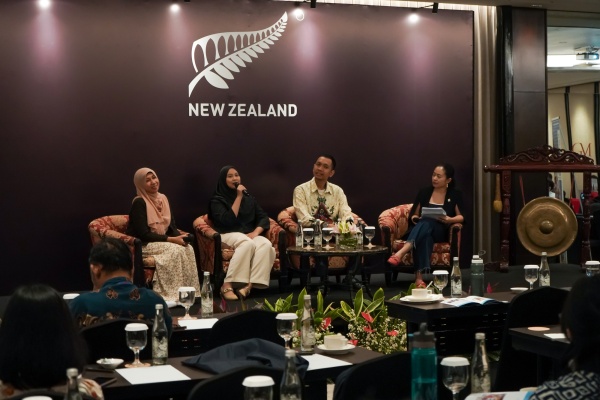
ENZ’s Naluri Bella moderating the alumni sharing session featuring alumni from different scholarship schemes at the New Zealand Alumni Day on 27 January 2024. From left to right: Nur Khaririyatun – Lincoln University, Master of Management of Agribusiness (Ministry of Agriculture scholarship), Alifia Sabila Putri – University of Canterbury (IISMA Scholarship), Moses Gregory Ginting – University of Auckland, Master of Energy (LPDP Scholarship).
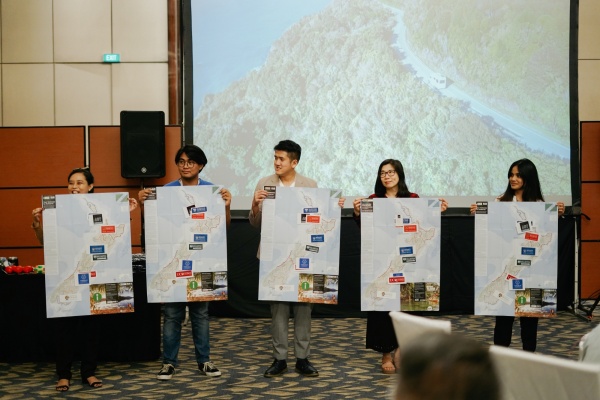
Agents in Jakarta engaged in interactive games to deepen their understanding of the beautiful and diverse landscapes and culture of Aotearoa New Zealand.
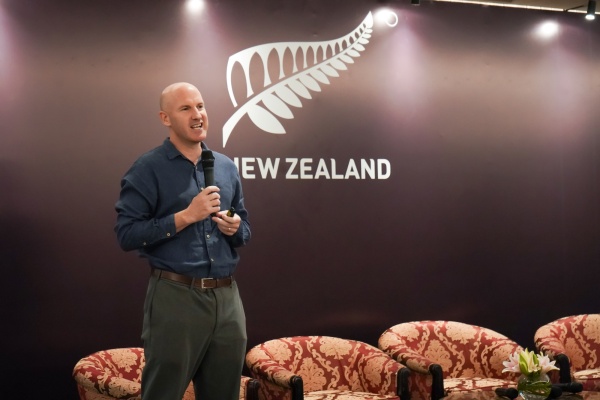
ENZ’s Ben Burrowes speaking at the New Zealand Alumni Day, highlighting the benefits of Study in New Zealand in front of the potential students.
-
PIF Recipient: Financial education platform for secondary schools
Founded in 2015, Banqer set out to tackle the global challenge of financial illiteracy. The team knew that school students were missing out on practical and engaging financial education, partly from a lack of curriculum-aligned resources, and partly from time-poor schools and teachers struggling to deliver financial education on top of everything else.
Research shows that 75% of us believe schools aren’t doing enough to combat financial illiteracy, and with financial education widely seen as a ‘circuit breaker’ for intergenerational inequality, something needed to change. That’s where Banqer’s award-winning platform came in. Through an online simulation, Banqer introduces students – from primary school through to secondary – to financial concepts like budgeting, savings, careers, insurance, renting, home ownership and investment.
"We've seen firsthand the engagement and impact that Banqer creates in New Zealand secondary school classes, and are excited to take this to the world with the support of Education New Zealand,' said Kendall Flutey, Co-Founder and CEO of Banqer
A step-change from textbooks or written resources of the past, Banqer helps students learn by doing. Learners explore their own simulative economy where they create fictitious bank accounts, earn income, pay expenses, invest, insure, budget and more.
Banqer is one of the recipients of the International Education Product Innovation Fund – an initiative funded by the New Zealand Government’s Covid Response and Recovery Fund and managed by ENZ, New Zealand’s dedicated agency for international education.
With Banqer’s platform already widely used by schools across New Zealand, the company is looking to scale up its impact and innovation to create financial empowerment for more learners around the world.
Support from the Product Innovation Fund will help the company scale Banqer High (its platform for secondary school learners) across Australia and validate new markets, including in North America. The funding will also help develop Banqer Beyond, a new product which aims to bring Banqer’s financial education to a broader audience beyond schools, which could include workplaces, community settings, or direct to consumers.
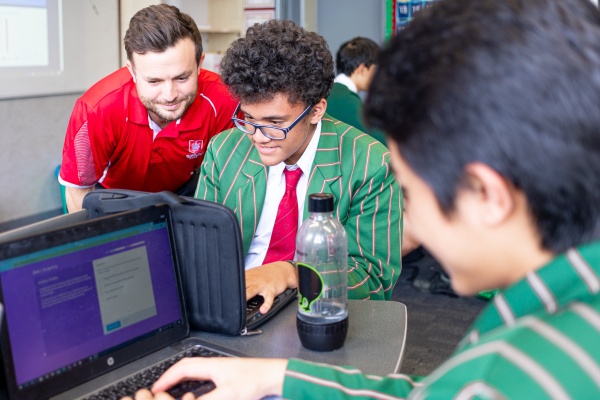
Banqer was a natural fit for the Product Innovation Fund, which is supporting seven pilot projects that deliver new, meaningful and unique learning experiences from New Zealand to the world. These pilots reimagine what a New Zealand education experience can look like and mean for global learners.
From New Zealand to the world, Banqer’s technology is setting learners on track for better financial futures. And thanks to the partnership between Banqer and ENZ, the stage is set for this New Zealand-built product to have an even greater impact around the world, delivering financial education and empowerment to learners wherever they are.
More information:
Learn more about Banqer.
-
PIF Recipient: Mission New Zealand
With support from Education New Zealand Manapou ki te Ao, New Zealand’s government agency for international education, Mission New Zealand showcases courses from a number of New Zealand institutes, and is being developed by The Mind Lab.
Mission New Zealand offers a fully immersive and distinctly New Zealand experience. It focuses on the best of what New Zealand has to offer and the benefits of being part of a global movement for positive change.
From anywhere in the world, learners can choose from a mix of short courses and micro-credentials, grouped around four themes that reflect New Zealand’s progressiveness and values: culture, tech innovation, creativity and sustainability. Courses range from one to 15 weeks in length, with a mix of free and paid options available.
A selection of The Mind Lab’s own micro-credentials is available on Mission New Zealand, along with offerings from Te Pūkenga - New Zealand Institute of Skills and Technology - and some of New Zealand’s most innovative private training establishments.
Visitors to the site will be greeted by the world’s first 360° virtual pōwhiri, starting at the gates of Ngāti Whātua Orākei Marae in Auckland. They will experience being called onto the marae with a karanga and stepping onto the grounds to be welcomed by members of Ngāti Whātua.
Personalised learning, with optional content and stories, insights and other material will help learners experience what makes New Zealand unique.
Through an immersive experience, Mission New Zealand invites learners to take the first step in a lifelong connection with Aotearoa New Zealand.
The new platform is designed to address the increasing global demand for connections with purpose and cause, for online learning options, and for shorter and more flexible courses.
Mission New Zealand is among a range of pilot projects supported by Education New Zealand's Manapou ki te Ao Covid Response and Recovery Fund product and service diversification workstream. This New Zealand Government-funded initiative encourages the development of new products and services in the international education sector.
The Mind Lab was founded in 2013 and has a strong background in innovation, online education delivery that builds impactful futures and building community connections, including relationships with iwi and Māori-led organisations.
More information:
-
ENZ Agent Seminars in China make a strong impact for rebuilding connections
China is the largest source of international students for New Zealand with agents being the leading channel for student recruitment in this market. Building strong connections between providers and agents in China is critical to recovering student mobility, improving awareness of New Zealand as a study destination and strengthening New Zealand's market position. ENZ's Agent Seminars in China are a well-recognised and impactful way of building relationships with a range of key agents.
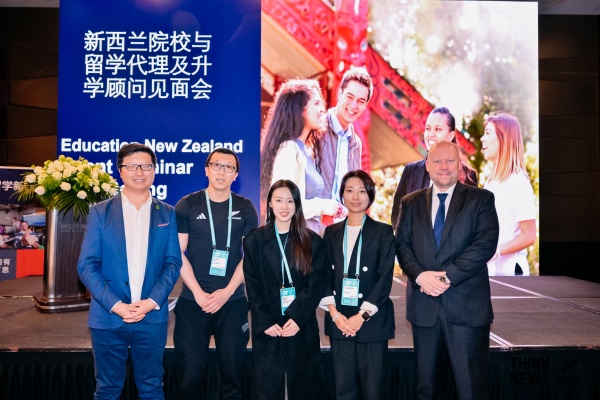
Education Counsellor and ENZ’s Regional Director Greater China, Michael Zhang, (far left) at the Beijing Agent Seminar with representatives from New Oriental Education Agency and H.E. Grahame Morton, New Zealand Ambassador to People’s Republic of China.
In addition, Agent Seminars also help to keep agents informed with the latest official information and is an important tool that Education New Zealand Manapou ki te Ao (ENZ) and other NZ Inc agencies use to share such information. According to recent Immigration New Zealand (INZ) data, agents in China have a high approval rate for student visa processing.
Currently, ENZ runs its Agent Seminar series twice a year in this region and this latest series of events held in Chengdu, Shanghai, Hong Kong and Beijing were supported by the New Zealand Ministry of Foreign Affairs and Trade (MFAT) and INZ. INZ’s China-based representatives gave in-person presentations, an initiative which was well received with 88% of agents reporting its inclusion as “very or extremely important to their attendance” in a post-event survey.
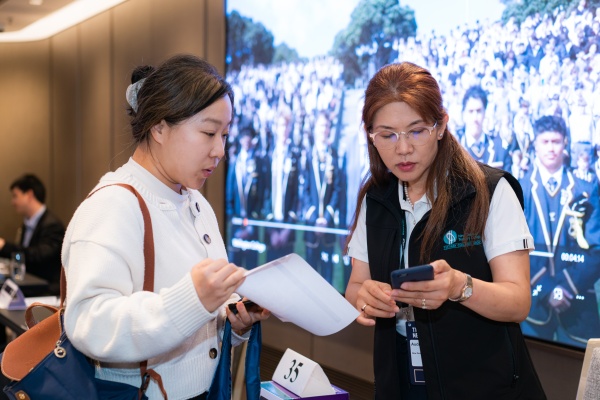
Participants at the Hong Kong Agent Seminar discuss New Zealand education offerings.
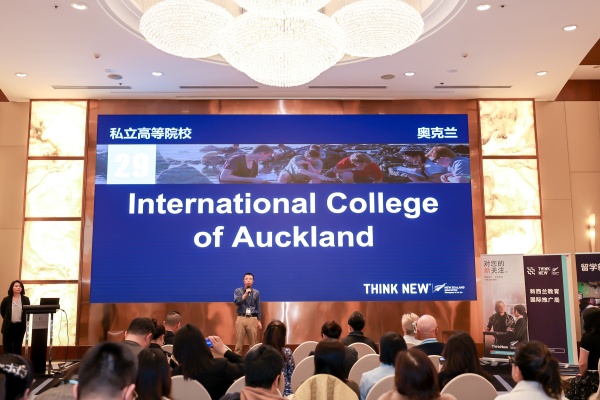
Kevin Wang from the International College of Auckland presenting at the Shanghai Agent Seminar.
To leverage the visibility of New Zealand education providers in the China market, ENZ facilitated media interviews and social media recordings for participants at the Shanghai and Chendgu Seminars. New Zealand providers and ENZ representatives in Chengdu conducted interviews with 13 journalists, the highest response rate for media attending Agent Seminars to date. As a result, three million views were achieved from 58 stories published by 27 local media outlets, with New Zealand university representatives quoted in a media story and an exclusive interview and story for Te Pūkenga on the uniqueness of New Zealand's vocational education in a separate article.
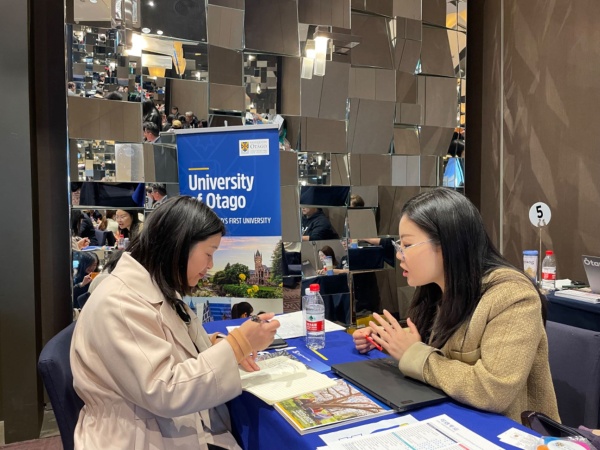
Joyce Zhang, University of Otago, is interviewed by a journalist from local media in Chengdu at the ENZ Agent Seminar.
In Shanghai, the ENZ Shanghai team delivered a China marketing insights session for sector representatives. The presentation titled “Unlocking China’s Education Market: Insights and tools for success” covered:
-
The key drivers of the consumer
-
China’s media/digital/social media landscape
-
The big four – WeChat, Little Red Book, Douyin and Bilibili (case studies included)
-
ENZ’s China local marketing plan.
Anyone interested in receiving a copy of the Marketing Presentation can access this here on ENZ’s Intellilab.
ENZ collaborated with Shinyway, the largest agent in the eastern region of China to produce short videos for the agency to promote online. The online promotion aimed to leverage brand awareness of a New Zealand education showcasing New Zealand providers attending the Shanghai event. A big kudos goes to the 18 brave New Zealand representatives who accepted the invitation to participate in the filming. Education Counsellor and Regional Director Greater China, Michael Zhang, was also interviewed to present the advantages of a New Zealand education and our institutions across all sectors.
Shinyway has published all the videos on their consumer-facing social media platforms, including WeChat, Little Red Book, and Weibo. The collaboration enhances New Zealand providers’ market exposure by leveraging Shinyway's influence across their digital platforms and reaching prospective audiences in China elevating our brand profile within a highly targeted audience group.
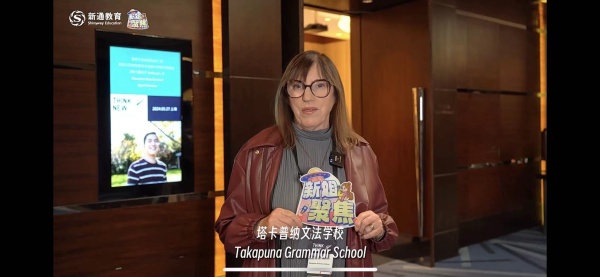
Mary Nixon, Principal of Takapuna Grammar School participating in the recording for sharing on social media. The first trial video published on Shinyway's WeChat received over 300 engagements including likes, shares, favorites and comments.
87.5% of New Zealand education providers also said that “attendance at the seminars was either “very valuable” or “valuable” for their organisation.”
The dates and locations for the next round of Agent Seminars in China will be announced soon. These details will be posted on the ENZ Events page along with the link for registering.
-
-
50 Malaysian educators experience New Zealand’s interactive early childhood education
On 9-10 May 2024, Education New Zealand Manapou ki te Ao (ENZ), the Ministry of Education Malaysia, and the University of Auckland co-hosted a two-day workshop for Malaysian educators. The theme of the workshop was "Engage, Explore, Excel: Interactive Play Strategies for Effective Preschool Education".
The workshop gave approximately 50 Malaysian preschool educators the opportunity to see and experience for themselves some of New Zealand’s innovative and interactive approaches to education that start in early childhood education facilities. The workshop was also an opportunity to strengthen bilateral ties between our two countries.
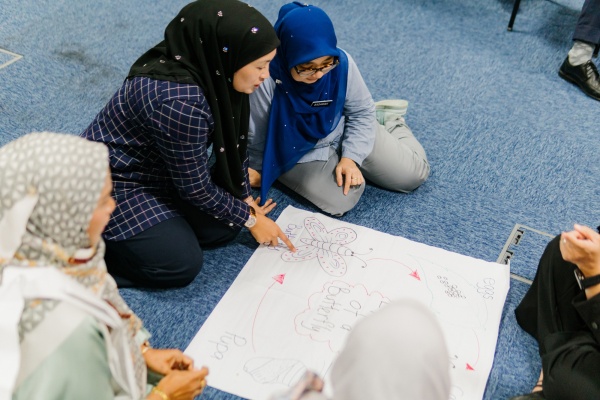
Workshop participants discussing learning techniques used in New Zealand early childhood institutions.
Professor Marek Tesar, a distinguished early childhood education expert from the University of Auckland led the workshop and shared his expertise with the group. He highlighted innovative approaches to implementing interactive outdoor play and used practical insights with theoretical foundations to enhance the educators' skills and knowledge. This included leading the group through experiential activities and thought-provoking discussions, including how outdoor play can instil a sense of environmental stewardship among teachers and children.

Malaysian early childhood educators at the workshop on "Engage, Explore, Excel: Interactive Play Strategies for Effective Preschool Education".
Ben Burrowes, ENZ’s Regional Director Asia (excluding China) and Acting General Manager International, and Emma Verry from the New Zealand High Commission in Kuala Lumpur attended the session and extended warm welcome remarks, underscoring the importance of international collaboration in advancing early childhood education in both countries.

From left to right: ENZ’s Ben Burrowes, Juraida Binti Umat Bidin, Deputy Director of Preschool Sector Curriculum Development Division and Nooraini Binti Kamaruddin, Senior Deputy Director Curriculum Development Division from the Ministry of Education Malaysia, Emma Verry from the New Zealand High Commission, ENZ’s Market Manager for Indonesia and Malaysia Naluri Bella, and University of Auckland’s Professor Marek Tesar. They are pictured here after the exchange of commemorative gifts in recognition of the occasion.
Ben said that the workshop gave a wonderful opportunity for educators from Malaysia to come together to hear from Professor Tesar and explore the multifaceted benefits of interactive play.
“Our two countries recognise the critical importance of the formative years in a child’s development and the profound impact that quality early childhood education can have on their future success and well-being.
“Participants were all very enthusiastic about discovering new ways to engage and empower their students. We hope this will lead to more collaboration and sharing of ideas between our two countries that educators and students alike can benefit from,” said Ben.
-
Raising the profile of NZ’s PTEs with China education agents
In China, large education agencies play an important role in raising the awareness of a New Zealand education to prospective students and their families. For this reason, 10 director-level representatives from the largest Chinese agencies were invited to join a Famil tour by Education New Zealand Manapou ki te Ao (ENZ) to demonstrate in person how New Zealand offers a modern, high quality and sophisticated learning environment for Chinese students.
In early May, the group visited education providers in Dunedin, Invercargill, and Auckland with a full and varied programme including visits to high schools, a primary school, universities, institutes of skills and technology, and private training establishments. There were also several cultural and tourism activities planned as well as networking events with economic development agencies, private training establishments and English language schools.
A key part of the Famil was the networking function held at the end of the week of activities at Media Design School in Auckland, providing a platform for New Zealand’s Private Training Establishments (PTEs) and English Language Schools (ELS) to engage directly with the visiting agents. Representatives from 24 providers from Auckland, Christchurch and New Plymouth attended the event.

ENZ’s General Manager Māori, Ed Tuari, welcomes the guests to Media Design School with a mihi and welcome.
The event included opening remarks by ENZ’s General Manager Sector Engagement and Innovation, Wendy Kerr, who reiterated to the education agents that New Zealand’s PTEs and ELS play a vital role in New Zealand’s international education ecosystem.
“Our PTEs and ELS are renowned for their innovative programs, real world and practical approach and strong commitment to student success and employability.
These institutions equip students with the skills and knowledge needed to thrive as global citizens in today’s interconnected world.”
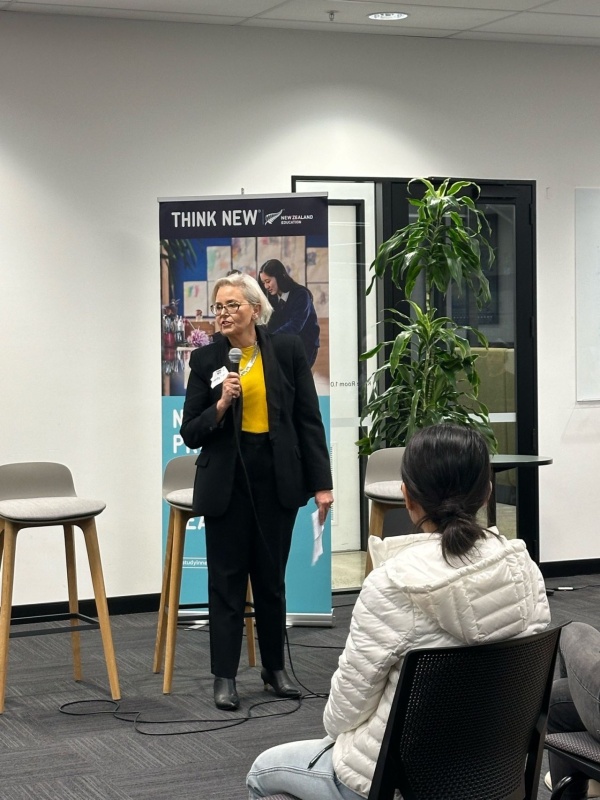
ENZ’S General Manager Sector Engagement and Innovation.
On behalf of ENZ, Wendy also expressed her appreciation to the agents for their ongoing collaboration and support, saying that the agents’ promotion of New Zealand PTEs and ELS opens doors for Chinese students to access world-class education and invaluable international experiences.
A panel discussion took place, focusing on the opportunities and challenges in the China market, featuring three directors moderated by Ruth Cooper, Country Director New Zealand of Media Design School and QTI co-Chair.
During the panel discussion, the agents suggested that providers could enhance their promotion efforts in China by highlighting employment opportunities and utilising Chinese social media to share the most up-to-date information.
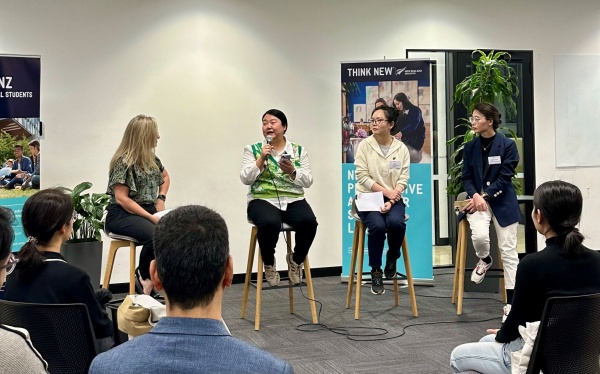
Ruth Cooper, Country Director New Zealand of Media Design School and QTI co-Chair (left) facilitates a panel discussion on the opportunities and challenges in the China education market.
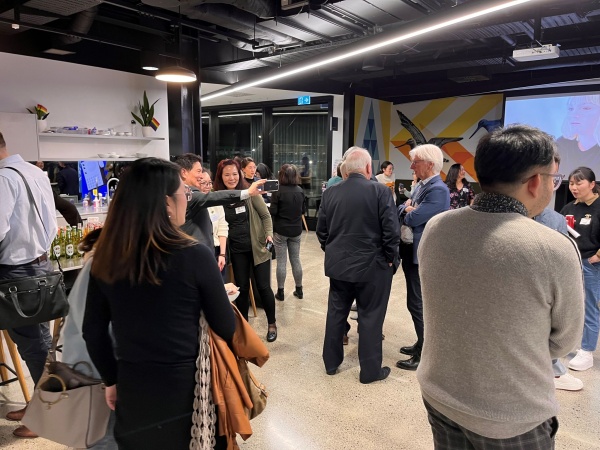
With the formalities out of the way, our education providers had the opportunity to mix and mingle with the education agents.

